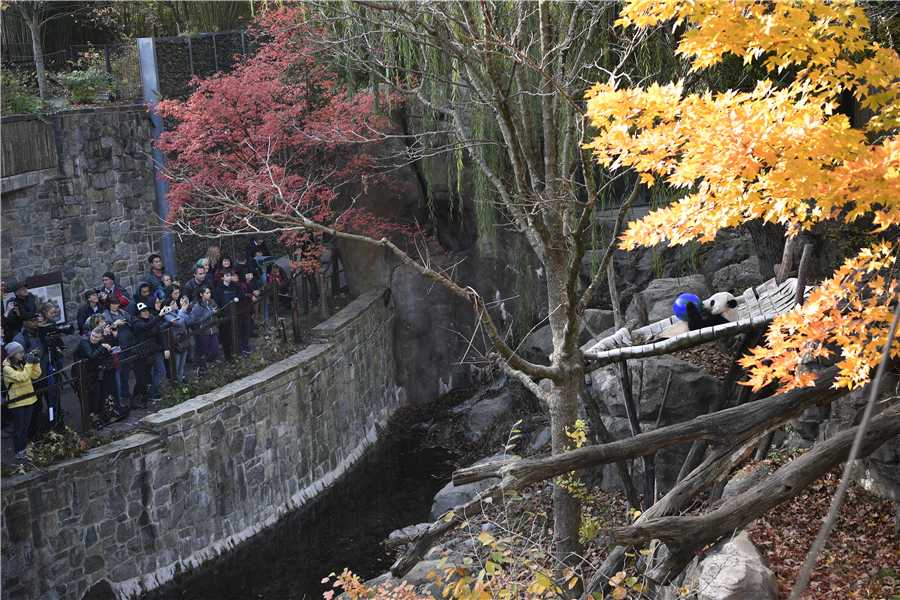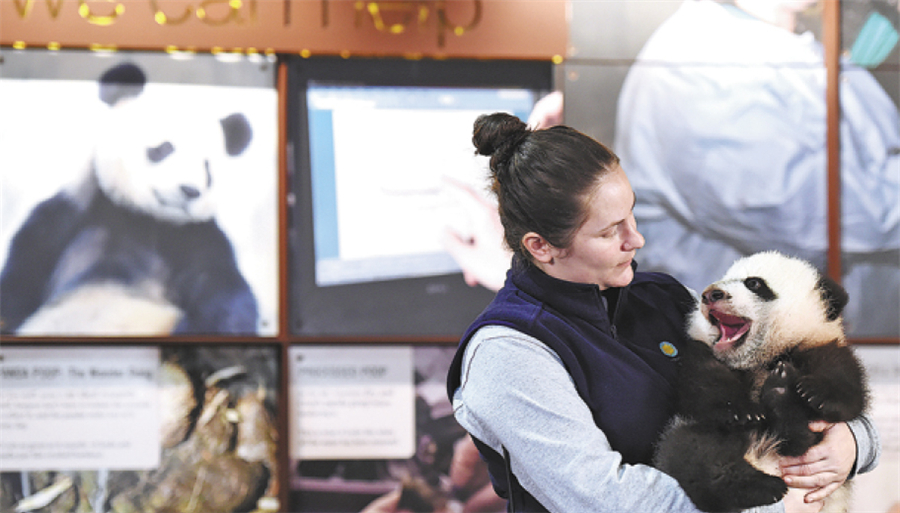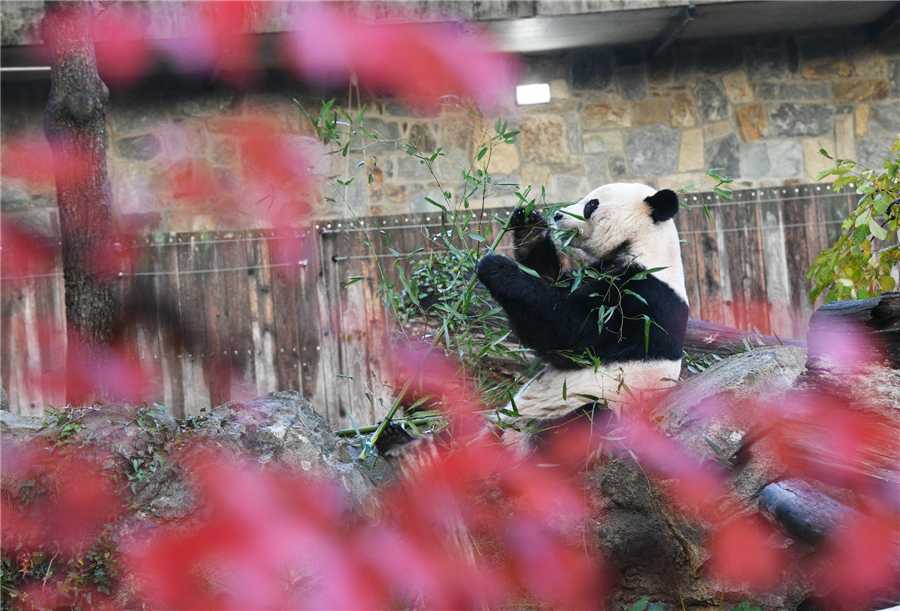
Bei Bei undergoes a physical checkup on Nov 13 before leaving the Smithsonian's National Zoo and Conservation Biology Institute in Washington on Tuesday. [Photo/Xinhua]
Four-year stay in United States ends for Bei Bei
It was nearly 4 pm on Monday, time for the indoor giant panda habitat at the Smithsonian's National Zoo and Conservation Biology Institute in Washington to be cleaned by keepers.
But dozens of visitors still lingered at the glass enclosure where 4-year-old male Bei Bei was playing.
They were following every move of the bear, ahead of his imminent departure.
As the animal was scheduled to leave for Chengdu, Sichuan province, on Tuesday, one video blogger from Los Angeles livestreamed footage of Bei Bei foraging in the den and eating a carrot, the animal's last meal in public in the United States.
Thousands of visitors joined "Bye Bye, Bei Bei", the zoo's weeklong celebratory event, to bid farewell to the "American Sweetheart", as he is known by some.
When he arrives in China on Wednesday, he will be in the care of Su Lingxiao during a 30-day quarantine period.
Su, 25, works as a keeper at the China Conservation and Research Center Base for the Giant Panda in Ya'an, Sichuan province.
As a young girl, Su raised rabbits in her home village in Longchang county, Sichuan.
Su, who majored in animal medicine at Jilin Agricultural Science and Technology University, has worked at the base since completing her university studies in 2016. Her duties include placing bundles of bamboo in panda pens and clearing away droppings.
"I feel very nervous because Bei Bei has received a lot of attention. But I think I can do well as I have accumulated a lot of experience in panda management," Su said. "I have taken care of about 10 pandas (at the base)."

Visitors join "Bye Bye, Bei Bei", a weeklong celebratory event at the Smithsonian's National Zoo, to bid farewell to the panda. [Photo/Xinhua]
Days before Bei Bei's scheduled arrival, Su disinfected the quarantine enclosure where he will stay. It has been vacant since April, when two pandas, Ru Yi and Ding Ding, completed their monthlong quarantine and headed for the Moscow Zoo in Russia for a 15-year scientific program.
Cheng Yanxi, a 39-year-old veterinarian at the base, said a flame was used to briefly burn corners and cracks in the wall in a 20-square-meter den-areas difficult to reach with disinfectants.
A major in animal medicine from Southwest Agricultural University in Chongqing, Cheng has worked at the base since 2004.
He does not know how many pandas sent to the base from overseas he has cared for, but said the routine for their 30-day quarantine never changes.
The animals have a blood test to determine if they have any liver or kidney problems, or if they have a protein deficiency.
Since joining the base, Cheng has not encountered any major problems with any of the pandas arriving from overseas during their quarantine, and thinks that Bei Bei will not have any difficulty adapting to his new surroundings.
Food, water and temperature are important factors in whether pandas can adapt to a new environment.
"Sichuan has dozens of bamboo species. Our base alone can provide at least five species for Bei Bei to choose from, whereas overseas, there may be only one or two species available," Cheng said.
"There is no industry in the mountains where the Bifengxia base is located and the water quality is good," he added.

Bei Bei is displayed at a news conference at the zoo in December 2015, four months after his birth. [Photo/Agencies]
At the Washington zoo on Monday, Cindy Gordon, who lives in the US capital, was taking photos with her smartphone. Tears streamed down her cheeks as she and other visitors finally had to leave at the repeated request of zoo workers.
"I feel so sad that Bei Bei is leaving," she said "He was the first panda I have ever bonded with when I moved here from New York."
Gordon said she had visited Bei Bei more than 40 times over the past four years and liked watching him do somersaults in the snow.
"The pandas live alone-they are so isolated-but Bei Bei seems to be so content and happy. So, when I moved here and I was feeling lonely, I looked at Bei Bei, and saw he was very happy to be on his own."
An area is being set up next to Bei Bei's outdoor habitat for well-wishers to write post cards to him in China.
Gordon wrote on hers: "We are so sad that you're leaving (Washington) DC, but we're excited for the next chapter in your life. We hope you love your new home in China, and we hope to visit you there some day. Thank you for being our friend."
In recent weeks, panda keepers at the zoo have been making preparations to ensure Bei Bei is comfortable and safe during the 16-hour journey to China.
According to a statement from the zoo, the preparations included getting the cub used to a travel crate; first by training him to walk through it, then spending time inside with the door closed.

The cub eats at the zoo on Monday, a day before his departure. [Photo/Xinhua]
"Bei Bei is a male and will mate under the reproduction program. Training him how to stand will increase his stamina during mating, while sitting is the best posture for a physical checkup," she said.
Su, who lives in downtown Ya'an, arrives at the Bifengxia base before 9 am each day.
Her daily routine involves visiting the panda den to check on the occupant. If nothing is wrong, she cleans the den and feeds the panda four times before taking a bus just before 5 pm to the downtown area, where most employees at the base live in dormitory buildings.
Her routine with Bei Bei will follow this pattern, she said.
"Pandas sleep for about 12 hours a day. They wake two or three times during the night to eat and then fall asleep. I will install an app on my phone after Bei Bei arrives at the base so that I can monitor him at night from my dormitory."
Pandas only eat the central part of the bamboo plant, which at this time of year is just the stalk, so they waste a lot. Visitors to the Bifengxia base can see the bamboo being transported by trucks.
"Keepers at the base feed pandas bamboo, bamboo shoots, a special bun, carrots and apples. We give each panda 30 kilograms of bamboo a day, and they eat more than 10 kilograms daily, but only the best part of the bamboo," Su said.

